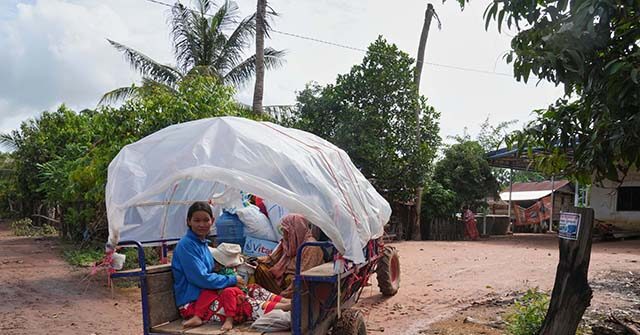The ceasefire negotiated by President Donald Trump between Thailand and Cambodia appeared to be holding on Tuesday, although Thailand complained about Cambodia violating the agreement by “launching continuous and indiscriminate attacks on Thai territory across various areas along the border.”
The ceasefire, announced as a handshake deal between Cambodian Prime Minister Hun Manet and Thailand’s Acting Prime Minister Phumtham Wechayachai on Monday, was scheduled to take effect at midnight. Thai officials said Cambodian forces continued firing across the border after the midnight hour arrived.
“We responded without going overboard. When they fired small arms, we fired small arms back. We did not escalate. At the moment, it is considered calm,” Thai Prime Minister Wechayachai told reporters.
Meetings between local military commanders were held as scheduled on Tuesday despite the violation complaints. The commanders agreed to stop shooting across the border, stop repositioning their forces for new attacks, and give each other time to recover the dead.
It was vital for the military commanders to meet and accept the ceasefire. In both Cambodia and Thailand, the military wields considerable political influence, and therefore is not completely controlled by the civilian government.
“We agreed not to send more troops. That is the key development,” said Lim Menghour, director-general of the lower house of the Cambodian parliament.
“I think if Thailand fully implements the agreed terms in the meeting and resolves the conflict peacefully, the situation will be back to normal pretty soon,” said Lim.
The long-simmering border dispute between Cambodia and Thailand erupted last Thursday, after five Thai soldiers on border patrol were injured by a landmine. One of the soldiers lost his leg in the explosion.
Thai and Cambodian troops in the area attacked each other with a speed and vigor that surprised many observers. The two nations have been fighting over their disputed border, established by incomplete treaties and unfinished commissions, for over a hundred years.
Hostilities have erupted several times in recent years, usually when soldiers from each country accuse each other of trespassing on sacred ground. For complex reasons of religion and national pride, Thailand and Cambodia seem incapable of agreeing on exactly where the border should be drawn and which ancient temples should lie on either side of it. The landmine that wounded the five soldiers last week was reportedly left over from a previous border clash.
The situation escalated very quickly last week, resulting in at least 38 deaths and displacing over 260,000 people. President Trump leveraged U.S. trade with both countries to “request a ceasefire,” as he put it. Trump made it clear that both Thailand and Cambodia would be unable to reach trade agreements with the United States if a war was raging.
Trump relayed a few messages back and forth between the Thai and Cambodian governments, ultimately getting Wechayachai and Manet into the same room for a meeting hosted by Malaysian Prime Minister Anwar Ibrahim, where they shook hands on a ceasefire.
Regional analysts said Thailand has an advantage in firepower, but also has a shaky economy that could crater without a deal to reduce U.S. tariffs. This made both sides receptive to Trump’s encouragement for a truce. Both countries will face 36 percent tariffs on exports to the United States if they do not make a deal by the end of this week.
“Cambodia fully supports the initiative from the U.S., particularly President Donald Trump, to end the conflict or to immediately have a ceasefire,” Lim Meghour said on Monday.
“Our prime minister received a call from U.S. President Donald Trump who offered mediation to end this conflict, and immediately our prime minister accepted the offer,” he said.
The ceasefire held up well enough on Tuesday for some displaced villagers to return home.
“I am very concerned that new fighting may break out. Thailand often provokes the fighting first, but then accuses Cambodia. Their aim is that they want to occupy our temples. I really don’t want to see any new fighting happen,” a returning Cambodian villager told the Associated Press (AP) on Tuesday.
“I still don’t feel comfortable, because they just announced it for the first day. I’m not confident. If it breaks out again, I’ll have to go,” a returning Thai villager said.
Read the full article here


